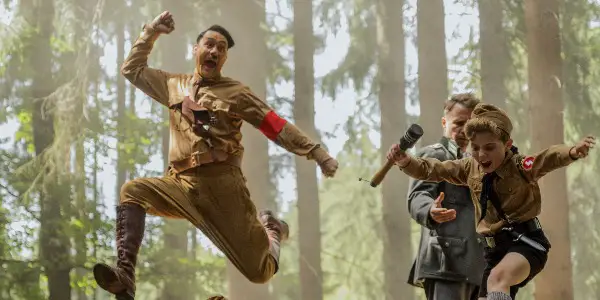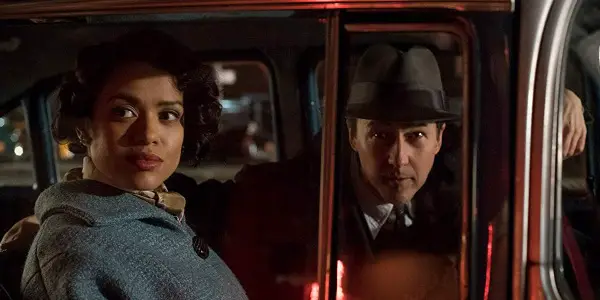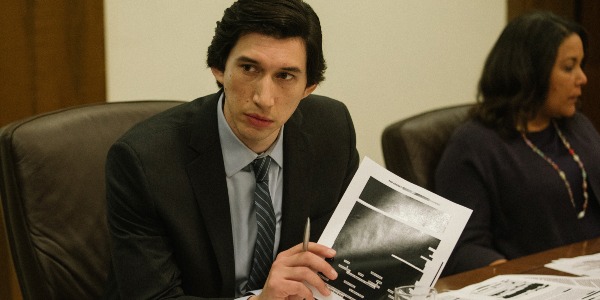2019 Film Fest 919 Report 4: JOJO RABBIT, MOTHERLESS BROOKLYN & THE REPORT

I'm a student at the University of North Carolina at…
In my latest report from Film Fest 919, I’m back with reviews of three more festival hits. Check out reviews of Taika Waititi‘s controversial Hitler satire, Edward Norton‘s noir opus, and Scott Z. Burns‘ riff on All the President’s Men. First, let’s tackle the “anti-hate” satire: Jojo Rabbit.
Jojo Rabbit (Taika Waititi)

Regardless of whether it deserves attention or not, Taika Waititi‘s Jojo Rabbit is destined to be one of the most talked-about films of this awards season. In fact, its status as a lightning rod of controversy was practically preordained from its initial announcement — how could a satire featuring a goofy, imaginary version of Adolf Hitler (played by Waititi himself) not generate a good deal of discussion? By dealing with Nazism and the horrors of the Third Reich in a semi-serious, semi-farcical manner, Jojo Rabbit plants its feet firmly in tricky, dangerous, and potentially brilliant territory.
And then it drops the ball.
Young Jojo (Roman Griffin Davis) is, by all accounts, a Nazi fanboy; a jubilant, brainwashed member of the Hitler Youth. The war is nearing the beginning of the end, but Jojo still faithfully believes every word that comes out of the mouths of his Nazi superiors — even the dopey Captain Kletzendorf (Sam Rockwell) and Fraulein Rahm (Rebel Wilson). Jojo is so enamored with this culture of fascism and fanaticism that Hitler is actually his imaginary best friend, a silly source of encouragement when his fellow fanatics belittle him. Unfortunately, this courage sometimes gets the young boy in trouble — in one of the film’s better moments of deadpan humor, Jojo accidentally blows himself up with a grenade after a bit of prodding from his imaginary friend.
The scarring from the grenade blast leaves Jojo at home for a while, where he lives with his mother, the kind and loving Rosie (Scarlett Johansson). What Jojo doesn’t know is that his mother is hiding a big secret in the walls of their peaceful German home — a teenage Jewish girl by the name of Elsa (Thomasin McKenzie). This, of course, completely rocks the young boy’s world.
Jojo Rabbit is always trying to pull off a billion different tones and moods at once, but it is consistent in one regard: it is profoundly unfunny from start to finish. There are a few laughs, sure, but Waititi makes the mistake of scraping the bottom of the barrel, fishing for the easiest and broadest laughs when something more precise would have sufficed. You’ve heard every one of these Nazi jokes before, and few of them feel novel or especially clever in the context. While Jojo Rabbit naturally operates in a mode of silly exaggeration, its absurdist treatment of the material — its emphasis on Jojo’s extreme internalization of Nazi ideology, its reliance on caricatures of Nazis — is never insightful or amusing. Even Waititi‘s starring role as Hitler, which remains the film’s boldest conceit, falls entirely flat.
Jojo Rabbit‘s first two acts are utterly insufferable, so desperate for laughs and so basic and labored in its execution that the idea of anyone finding this controversial or risky becomes the funniest thing about it. The finale is more interesting, yet it makes its failures as a film more pronounced. While it never totally does away with the cutesy nonsense, Jojo Rabbit does eventually become a more serious and emotionally resonant film. Jojo receives a rude awakening, and Waititi essentially tracks the ramifications of the young boy’s earth-shattering epiphany for the remainder of the running time. The results are occasionally effective, and young stars Davis and McKenzie do their best to make their forced friendship click.
Frustratingly, the film’s path from blind faith to a stark encounter with the truth never fully captures the scope of Nazism’s horrors. There are few mentions of the Holocaust or mass genocide; the most horrific event is only portrayed as horrific because it connects directly to Jojo. I understand that, in a PG-13 film aimed at teenagers and kids, it’s difficult to depict the true bleakness and inhumanity of the Nazis. But if the content of a film expressly about Nazi Germany can’t fully reckon with its grave sins, maybe it was a bad idea from the start.
Motherless Brooklyn (Edward Norton)

In some rare and surprising cases, outrageously low expectations can be a good thing. Case in point: Edward Norton‘s Motherless Brooklyn, the actor-turned-writer/director’s much-hyped and much-maligned adaptation of Jonathan Lethem‘s noir novel. Since the sprawling drama’s premiere at the Telluride Film Festival, it seems like buzz has been consistently on the decline, with a number of critics and fans of the book trashing Norton‘s creative choices and book-to-film alterations (disclaimer: I’m unfamiliar with the source material). Even though it’s probably not good for critics to admit that we’re not looking forward to specific films, I walked into Motherless Brooklyn with a certain degree of dread. Reviews were (and still are) mixed, the runtime is positively monumental at 144 minutes, and I don’t have any connections to the book: did Norton‘s passion project really have much to offer me as a moviegoer?
Naturally, in a twist worthy of a film noir classic, Motherless Brooklyn is actually something of an effective journey. The film follows Lionel Essrog (Norton), a private detective working under the wing of Frank Minna (Bruce Willis), a seasoned professional in the business. Frank is always cool as a cucumber; Lionel, on the other hand, suffers from a particular version of Tourette’s syndrome that causes him to involuntarily twitch, shout, and re-organize the world around him. At the film’s start, Frank is meeting with a group of thugs on what should be a routine operation. Instead, it ends with him getting a bullet in the stomach.
Frank doesn’t survive the attack, and his untimely death sends Lionel down a rabbit hole of chaos and corruption. In the quest to solve his mentor’s death, the private eye discovers the intersection of a powerful city planner (Alec Baldwin), a shady and possibly untrustworthy whistleblower (Willem Dafoe), and a woman (Gugu Mbatha-Raw) caught in the middle of this vast conspiracy, which could have significant ramifications for all of Brooklyn.
Norton‘s second feature is not a perfect film by any means, nor is it even a particularly noteworthy exemplar of the storied noir genre. The visual style from cinematographer Dick Pope illuminates the details of the era well, but it’s consistently over-lit — several scenes resemble the light-soaked work of Spielberg collaborator Janusz Kaminski, and not necessarily in a good way. Yet this period epic does come with its fair share of pleasures, from the impressive cast to the complex, sometimes labyrinthine crime narrative. The details of its story aren’t particularly memorable in the long run, but in the moment, Norton imbues the film with just enough propulsive momentum to keep things interesting, leaving viewers eager to discover the next big reveal.
But that’s not the ultimate point of the elaborate affair. Though it doesn’t always know what to do with it, Norton‘s film possesses a melancholic sensibility, and it uses that to reach some interesting ends. After burying itself knee-deep in a confusing and complicated plot for much of its 2.5 hour running time, Motherless Brooklyn ends on a note of warmth and camaraderie between Norton and Mbatha-Raw‘s characters. They’re just two lonely pawns in a game that goes well beyond their reach; in the end, they’ve only got each other.
It’s surprisingly touching, and it’s a welcome finale for a film that often borrows from much more fatalistic noir classics. The film basically plays like discount Chinatown, but compared to some of 2019’s other riffs on 70s classics, Norton‘s epic is a whole lot more successful.
The Report (Scott Z. Burns)

If Motherless Brooklyn is 2019’s odd, imperfect riff on Chinatown, then Scott Z. Burns‘ The Report is our latest update of Alan J. Pakula‘s All the President’s Men for these politically tumultuous times. Of course, the seminal 1976 Watergate thriller has been a popular touchstone in recent years, influencing everything from the Oscar-winning Spotlight to Steven Spielberg‘s less effective The Post. Though The Report is not a newspaper film like its predecessors, the procedural compilation of research is a natural fit for this production, which chronicles the trials and tribulations of congressional researcher Daniel Jones (Adam Driver). Tasked with assembling a report on the Central Intelligence Agency’s use of “enhanced interrogation” techniques (also known as torture) for Senator Dianne Feinstein (Annette Benning), Jones finds himself caught in a web of politics and modern history that goes well beyond his jurisdiction.
It’s a compelling foundation for a movie, and it offers very specific pleasures for those of us who enjoy this kind of story. But like so many recent films that misunderstand the effectiveness of classic films from the 1970s (hello there, Joker), The Report seems hellbent on creating the most obvious version of this story imaginable, employing flashbacks and didactic speechifying in order to guide its audience to the correct political, moral, and ethical conclusions. I don’t mean to suggest that The Report should be more ambiguous about whether torture was actually good or bad; instead, my belief is that the film should trust its audience to come to the correct conclusion.
Unfortunately, trusting its audience does not seem to be a concept in The Report‘s wheelhouse. While All the President’s Men and similar films operate by alluding to different investigative strands within the bigger picture, writer/director Burns is unable to conjure up the invigorating feeling of discovering a rapidly expanding web of blatant wrongdoing and corrupt cover-ups. Burns‘ most drastic dramatic misstep is his reliance on flashbacks: every time Jones makes progress in the investigation, we’re treated to a sepia tone flashback that chronicles whatever horrific event he found in the CIA files.
Why exactly do we need to see the details of the CIA’s torture techniques? Is this substantially doing anything to convey the gravity of our nation’s recent sins? I don’t think so — primarily, I think these scenes exist to keep audiences from getting bored. Essentially, The Report seemingly wants to emulate the procedural’s conventions without committing to the specifics of how that genre actually functions. It feels the need to break up its action, to spell out to the audience what exactly is happening and what it means. Even the limited information we receive about Jones’ mental and emotional state is spelled out — characters quite literally tell him that he’s too obsessed and too invested in this research, instead of letting Driver‘s performance do that work for us.
The lack of context around our lead character is indicative of a greater problem: The Report plays like two films squished together, and neither has enough room to breathe. The first half details the research, while the second half focuses on the specifics of what it took to get the torture report published. Both would make for interesting movies on their own; together, they almost cancel each other out. In fact, the scope of the story makes it hard to escape the feeling that The Report would have worked better as an Amazon limited series. A different format would have enabled Burns and his team to explore the case in greater detail, making the legal and personal danger for Jones and his team feel genuinely palpable. In its current state, The Report runs through its story too quickly—and in such an obvious, leaden manner — to ever make much of an impact.
Jojo Rabbit was released in the US on October 18, 2019 and will be released in the UK on January 3, 2020. For all international release dates, click here.
Motherless Brooklyn will be released on November 1, 2019 in the US and on December 6, 2019 in the UK. For all international release dates, click here.
The Report will be released on November 15, 2019 in the US and UK. For all international release dates, click here.
Does content like this matter to you?
Become a Member and support film journalism. Unlock access to all of Film Inquiry`s great articles. Join a community of like-minded readers who are passionate about cinema - get access to our private members Network, give back to independent filmmakers, and more.
I'm a student at the University of North Carolina at Chapel Hill. For 8 years, I've edited the blog Martin on Movies. This is where I review new releases, cover new trailers, and discuss important news in the entertainment industry. Some of my favorite movies- Casablanca, Inception, Singin' in the Rain, 2001: A Space Odyssey, The Wolf of Wall Street, The Nice Guys, La La Land, Airplane!, Skyfall, Raiders of the Lost Ark. You can find my other reviews and articles at Martin on Movies (http://martinonmovies.blogspot.com/).












